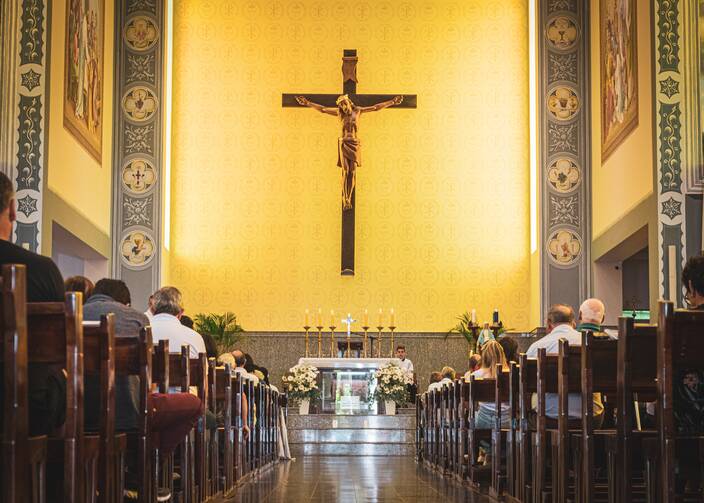A Homily for the Eleventh Sunday in Ordinary Time
Readings: Exodus 19:2-6a Romans 5:6-11 Matthew 9:36-10:8
Faith’s core challenge is not atheism. It is idolatry. It was the first sin of the chosen people, just after their election by God and their deliverance from Egypt. It is ours as well. We fashion gods who meet our needs in the moment. No, not molten calves, but deliberately false conceptions of God are still idols.
Why does idolatry come so easily to us? Because we know that God stands outside the world, yet we are told that God dwells within us. If we believe that God can only access the world through our own selves, it is a short step to conclude that our will and our ideas about God are always correct.
Not that we would put it that way. No, we simply say, primarily to ourselves, this is the will and the wisdom of God.
Yet in graced moments we often realize, as Paul Simon puts it in one of his newly released “Seven Psalms,” that our God is only ourselves writ large.
The Lord is a puff of smoke
That disappears when the wind blows
The Lord is my personal joke
My reflection in the mirror.
If the first task of faith is to entrust ourselves to God, then its second duty, equally important, is to shun self-fashioned idols. Our desire to make God to our own measure is great and primordial. Faith calls us to turn from ourselves toward someone else, someone whom we can love.
The quest for the living God over self-fashioned idols must be our own, but God has not abandoned us. God comes to our aid by way of mediation. Others stand between us and the living God. God chooses to come to us through their agency, in their company.
That any mediator should stand between us and God is not a comfortable notion. It chafes against our highly prized autonomy and individualism. But you cannot read Scripture and not encounter mediators. Moses is called to ascend to the mountain and intercede with God for his people. David is chosen to rule those people. The Annunciation is made to Mary; she accepts on our behalf.
The apostles are enumerated by name in St. Matthew’s Gospel. As John Henry Newman pointed out, “catalogues are given of them with such scrupulous care, in many of the holy books.” Why? Because they were “apostles of our Incarnate Lord.” “Their very being, as Apostles, depended entirely on their personal mission from Him.”
Of course, simply to accept the Scriptures as sacred is already to have engaged the mystery of the divine by way of mediation. Their authority comes to us through the all-too-human agency of the apostolic age.
And if you chafe at the notion of bishops and priests as mediators between yourself and God, remember that sacred Scripture, once shorn from its liturgical proclamation, is easily made to mean whatever we and our idol-fashioning hearts should desire. Hence our need for a living magisterium, which guides and admonishes and, when necessary, even corrects. It saves us from ourselves. If we have complete confidence in ourselves, we have too much confidence in ourselves.
Yet mediation cannot be reduced to the hierarchical because it is essentially horizontal. It has to do with who we are as humans. As creatures, we are incomplete within ourselves. All of us have a role to play in forming each other. We cannot become who we are meant to be without the mediation of others. You can see the essentially positive role of mediation when you consider its dark and negative converse.
In 2015, the psychiatrist Bessel van der Kolk wrote a book on trauma which is still a best seller, The Body Keeps the Score: Brain, Mind and Body in the Healing of Trauma. Its thesis, which science continues to affirm, is that life experiences, especially those that are traumatic, “change the function and structure of the brain—and even effect the genes we pass on to our children.”
Listen to how van der Kolk the scientist speaks of the essentially communal nature of trauma. Incidentally, if you were to substitute the word “sin” for “trauma,” you would gain an immeasurable insight into essential compatibility of science and faith:
When I give presentations on trauma and trauma treatment, participants sometimes ask me to leave out the politics and confine myself to talking about neuroscience and therapy. I wish I could separate trauma from politics, but as long as we continue to live in denial and treat only trauma while ignoring its origins, we are bound to fail. In today’s world your zip code, even more than your genetic code, determines whether you will lead a safe and healthy life. People’s income, family structure, housing, employment, and educational opportunities affect not only their risk of developing traumatic stress but also their access to effective help to address it. Poverty, unemployment, inferior schools, social isolation, widespread availability of guns, and substandard housing all are breeding grounds for trauma. Trauma breeds further trauma; hurt people hurt each other.
The doctrine of mediation does not stand upon faith alone. One need only consider the nature of the trauma we call sin to understand that, when it comes to our humanity, we are all in this together. Sin is mediated; so too is grace. Indeed, the Christian faith insists that God comes to us by way of human mediation, Christ himself being, in the words of 1 Timothy, the “one mediator between God and man” (2:5).








